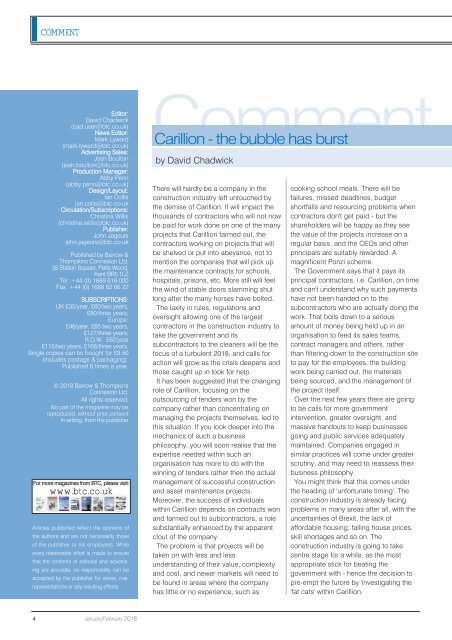Create successful ePaper yourself
Turn your PDF publications into a flip-book with our unique Google optimized e-Paper software.
COMMENT<br />
Editor:<br />
David Chadwick<br />
(cad.user@btc.co.uk)<br />
News Editor:<br />
Mark Lyward<br />
(mark.lyward@btc.co.uk)<br />
Advertising Sales:<br />
Josh Boulton<br />
(josh.boulton@btc.co.uk)<br />
Production Manager:<br />
Abby Penn<br />
(abby.penn@btc.co.uk)<br />
Design/Layout:<br />
Ian Collis<br />
ian.collis@btc.co.uk<br />
Circulation/Subscriptions:<br />
Christina Willis<br />
(christina.willis@btc.co.uk)<br />
Publisher:<br />
John Jageurs<br />
john.jageurs@btc.co.uk<br />
Published by Barrow &<br />
Thompkins Connexion Ltd.<br />
35 Station Square, Petts Wood,<br />
Kent BR5 1LZ<br />
Tel: +44 (0) 1689 616 000<br />
Fax: +44 (0) 1689 82 66 22<br />
SUBSCRIPTIONS:<br />
UK £35/year, £60/two years,<br />
£80/three years;<br />
Europe:<br />
£48/year, £85 two years,<br />
£127/three years;<br />
R.O.W. £62/year<br />
£115/two years, £168/three years.<br />
Single copies can be bought for £8.50<br />
(includes postage & packaging).<br />
Published 6 times a year.<br />
© 2018 Barrow & Thompkins<br />
Connexion Ltd.<br />
All rights reserved.<br />
No part of the magazine may be<br />
reproduced, without prior consent<br />
in writing, from the publisher<br />
For more magazines from BTC, please visit:<br />
www.btc.co.uk<br />
Articles published reflect the opinions of<br />
the authors and are not necessarily those<br />
of the publisher or his employees. While<br />
every reasonable effort is made to ensure<br />
that the contents of editorial and advertising<br />
are accurate, no responsibility can be<br />
accepted by the publisher for errors, misrepresentations<br />
or any resulting effects<br />
Comment<br />
Carillion - the bubble has burst<br />
by David Chadwick<br />
There will hardly be a company in the<br />
construction industry left untouched by<br />
the demise of Carillion. It will impact the<br />
thousands of contractors who will not now<br />
be paid for work done on one of the many<br />
projects that Carillion farmed out, the<br />
contractors working on projects that will<br />
be shelved or put into abeyance, not to<br />
mention the companies that will pick up<br />
the maintenance contracts for schools,<br />
hospitals, prisons, etc. More still will feel<br />
the wind of stable doors slamming shut<br />
long after the many horses have bolted.<br />
The laxity in rules, regulations and<br />
oversight allowing one of the largest<br />
contractors in the construction industry to<br />
take the government and its<br />
subcontractors to the cleaners will be the<br />
focus of a turbulent 2018, and calls for<br />
action will grow as the crisis deepens and<br />
those caught up in look for help.<br />
It has been suggested that the changing<br />
role of Carillion, focusing on the<br />
outsourcing of tenders won by the<br />
company rather than concentrating on<br />
managing the projects themselves, led to<br />
this situation. If you look deeper into the<br />
mechanics of such a business<br />
philosophy, you will soon realise that the<br />
expertise needed within such an<br />
organisation has more to do with the<br />
winning of tenders rather then the actual<br />
management of successful construction<br />
and asset maintenance projects.<br />
Moreover, the success of individuals<br />
within Carillion depends on contracts won<br />
and farmed out to subcontractors, a role<br />
substantially enhanced by the apparent<br />
clout of the company.<br />
The problem is that projects will be<br />
taken on with less and less<br />
understanding of their value, complexity<br />
and cost, and newer markets will need to<br />
be found in areas where the company<br />
has little or no experience, such as<br />
cooking school meals. There will be<br />
failures, missed deadlines, budget<br />
shortfalls and resourcing problems when<br />
contractors don't get paid - but the<br />
shareholders will be happy as they see<br />
the value of the projects increase on a<br />
regular basis, and the CEOs and other<br />
principals are suitably rewarded. A<br />
magnificent Ponzi scheme.<br />
The Government says that it pays its<br />
principal contractors, i.e. Carillion, on time<br />
and can't understand why such payments<br />
have not been handed on to the<br />
subcontractors who are actually doing the<br />
work. That boils down to a serious<br />
amount of money being held up in an<br />
organisation to feed its sales teams,<br />
contract managers and others, rather<br />
than filtering down to the construction site<br />
to pay for the employees, the building<br />
work being carried out, the materials<br />
being sourced, and the management of<br />
the project itself.<br />
Over the next few years there are going<br />
to be calls for more government<br />
intervention, greater oversight, and<br />
massive handouts to keep businesses<br />
going and public services adequately<br />
maintained. Companies engaged in<br />
similar practices will come under greater<br />
scrutiny, and may need to reassess their<br />
business philosophy.<br />
You might think that this comes under<br />
the heading of 'unfortunate timing'. The<br />
construction industry is already facing<br />
problems in many areas after all, with the<br />
uncertainties of Brexit, the lack of<br />
affordable housing, falling house prices,<br />
skill shortages and so on. The<br />
construction industry is going to take<br />
centre stage for a while, as the most<br />
appropriate stick for beating the<br />
government with - hence the decision to<br />
pre-empt the furore by 'investigating the<br />
'fat cats' within Carillion.<br />
4 January/February 2018

















